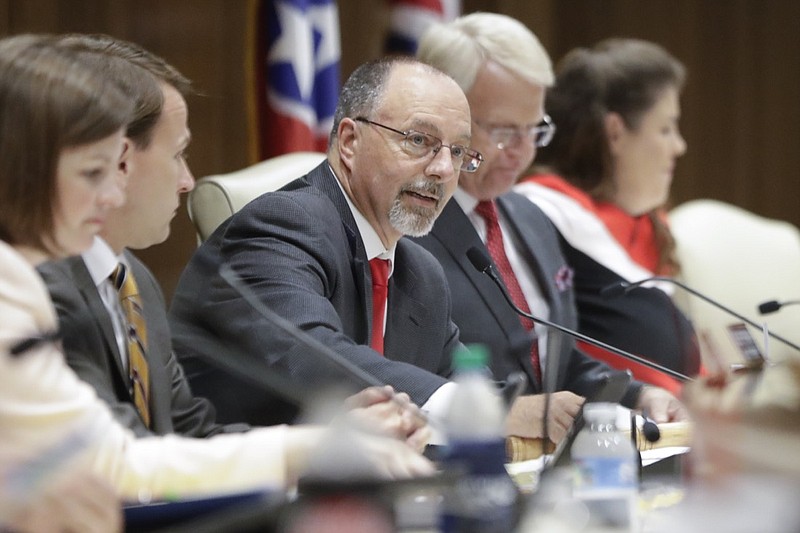NASHVILLE - After two days of hearings earlier this week, Tennessee Senate Judiciary Committee Chairman Mike Bell said he is weighing whether a bill trying to ban abortions once a woman learns she's pregnant is the right vehicle to mount a new legal assault against the U.S. Supreme Court's 1973 decision that legalized the procedure.
"I'm still truly undecided on whether Senate Bill 1236 will be effective or not," the Riceville Republican said after nearly nine hours of sometimes-emotional testimony from both sides on Monday and Tuesday. "We're trying to figure out if this is the most effective means to overturn Roe v. Wade."
He added: "There's probably a couple of other committee members in that same boat."
Bell, an abortion opponent, said he hopes to "come to a solid position" on the proposal, put forth by Sen. Mark Pody, R-Lebanon, by the time state lawmakers return to the capitol in January to begin their annual session.
Pody's amended bill - his original measure was a copycat version of "fetal heartbeat" bills adopted by other states including Georgia and Arkansas and blocked by federal judges - doesn't rely on detection of a fetus' heartbeat, usually around 16 weeks.
It relies instead on a hormone test that can detect pregnancy as early as 11 days. And the legislation also seeks to detour around the legal reasoning used by the Supreme Court in Roe and the Supreme Court's 1982 Planned Parenthood v. Casey decision, which rested on protections under the due process clause of the U.S. Constitution's 14th Amendment.
Instead, the bill attacks Roe and declares there is "discord" with regard to a "central position" in the Constitution's Ninth Amendment and the "absolute right" in common law of "personal security."
David Fowler, a former state senator from Signal Mountain and an attorney who now heads the Family Action Council of Tennessee, has advocated that approach.
During this week's hearings, attorneys for both National Right to Life and Tennessee Right to Life said they didn't think the legal strategy nor the issue would pass legal muster, especially with the Supreme Court.
They urged Republicans to avoid a full frontal assault and enact a more modest law that might produce divisions among different federal appellate courts, spurring the Supreme Court to hear it.
Sen. Katrina Robinson, D-Memphis, argued during one of Bell's committee hearings that "we don't want to impede on the rights of women to make their own independent decisions about their body. And we want to make sure we protect health care that's available to women, and this bill would ultimately limit that."
Bell later said his goal is to see Roe v. Wade overturned.
"What is going to be the best strategy, best vehicle to get us there?" he said.
Sen. Todd Gardenhire, R-Chattanooga, also an abortion opponent and Judiciary Committee member, said after the hearings that "to me this hearing we had the last two days was supposed to be on is this bill a constitutionally sound bill. Is it one we can travel with to challenge Roe v. Wade - that was the question.
"We had a lot of emotion, people giving personal testimonies that really wasn't relevant to the question of this bill. We have to separate as legislators the issue surrounding the bill versus is this bill a proper bill to do it."
Calling Fowler's proposed Ninth Amendment approach an "interesting concept," Gardenhire said he needs to do "some personal homework" on common law.
Senate Minority Leader Jeff Yarbro, an attorney and Nashville Democrat, said that while Tennessee is hardly a liberal state, "this latest [bill] is over the top" as well as "glaringly unconstitutional." It "will lead to the state wasting taxpayers' dollars" with the money being awarded to the American Civil Liberties Union and other groups suing to stop it.
He urged Republican colleagues to shift their sights to the state's dismal rankings in health care and other areas, saying lawmakers could have "thousands of conversations about helping mothers, families and children."
One potential avenue that's attracting Bell's attention is a now-blocked Indiana law. It sought to ban abortions based on a fetus' sex, race or disability. The Supreme Court declined to review the provision, leaving intact a prior 7th U.S. Circuit Court of Appeals ruling that upheld a lower court's decision to strike it down.
But in his opinion, the Supreme Court's most conservative justice, Clarence Thomas, indicated he could be open to considering whether decisions on abortions could continue to be based on disability and race, citing Nazi Germany's fanatically extreme selective breeding programs.
"Given the potential for abortion to become a tool of eugenic manipulation, the Court will soon need to confront the constitutionality of laws like Indiana's," Thomas wrote, adding later, "Although the Court declines to wade into these issues today, we cannot avoid them forever."
In Bell's view, Thomas "said this is an issue that needs to percolate more. Which I take as a sign - I think most legal experts take as a sign - that that was an encouragement for other states to look at doing this, maybe get other circuits to look."
He later noted "maybe that's an idea we can look at to create a conflict" and an argument potentially more favorable so the 6th U.S. Circuit Court of Appeals, which includes Tennessee, might accept the argument.
Kentucky, which is in the 6th Circuit, passed a similar law that a federal district judge has enjoined. Critics charge the law unconstitutionally inserts the state into a private medical decision.
Contact Andy Sher at asher@timesfreepress.com or 615-255-550. Follow him on Twitter @AndySher1.
